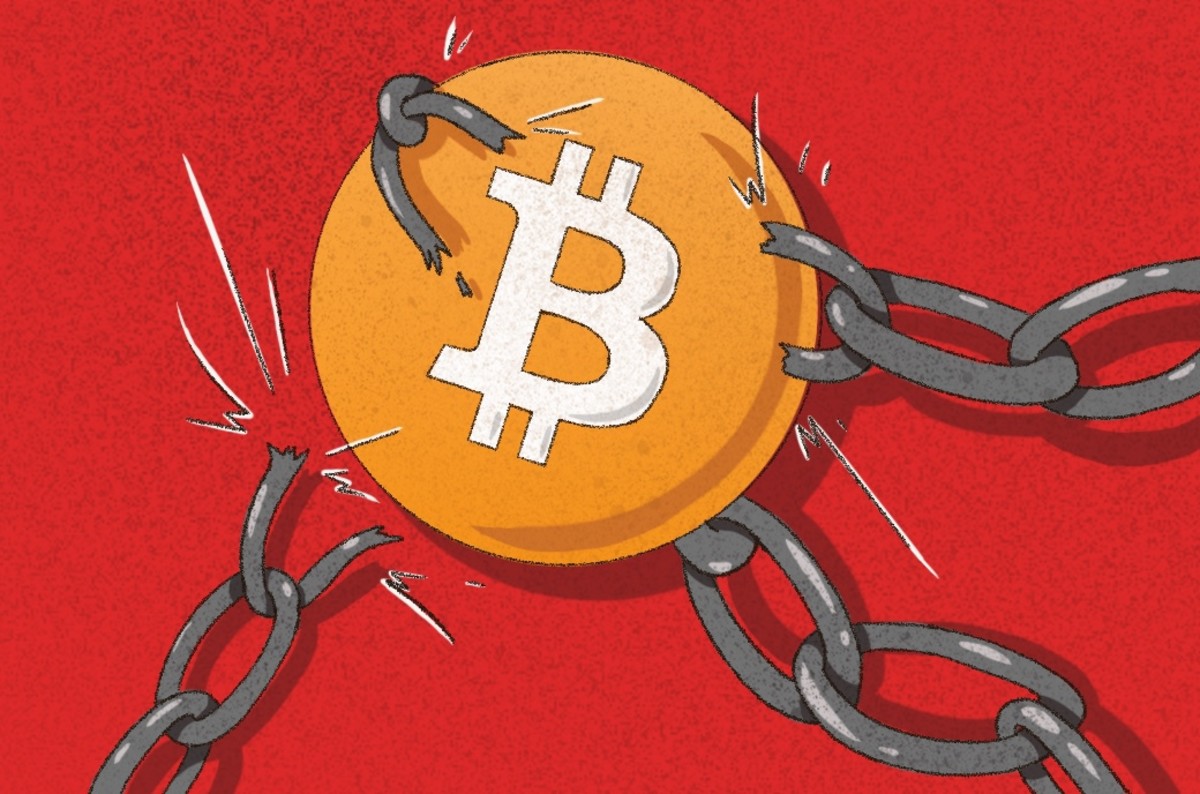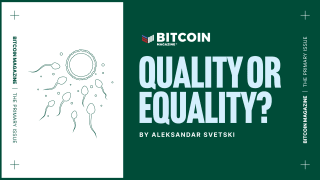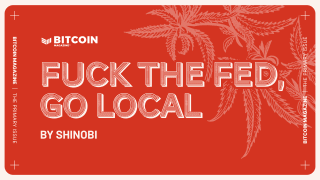Discussion around Bitcoin for years relegated it to being a bubble, tulipmania or some Ponzi scheme, but now even disbelievers likely acknowledge that Bitcoin is here to stay. What they may not realize is that beneath the veneer of charlatans, gamblers and grifters is a movement slowly making progress towards a grand vision of the future. A future where money is the medium of a flourishing society rather than an oppressive arm of the state.
Since the odds of Bitcoin collapsing in on itself grow slimmer each passing day, Bitcoin's enemies have begun coming to terms with what its steady progress means for them. As they slowly realize the ensuing revolution, politicians and central bankers are starting to say the quiet part out loud by arguing that Bitcoin is a threat.
For once, Bitcoin's opponents are actually correct in their analysis of the subject. A threat is exactly what Bitcoin is: a vicious threat to fiat currencies and government coercion everywhere. While the media has chosen to spread this idea as Fear, Uncertainty and Doubt (FUD), Bitcoiners embrace it as the reason for Bitcoin's entire existence: a practical means to separate money from state.
There are two falsehoods society has strangely accepted as truth: a) it is natural for government to control money and b) inflation is necessary. People argue in favor of separating powerful institutions when it comes to church and state, yet they do not apply that same logic when discussing money and state. Money's impact on society cannot be understated as it is the means by which people transact value and interact with the economy. Putting this powerful institution in the hands of government, another extremely powerful institution with a history of misusing said power, is the natural conclusion we draw?
When government is given full control over money, it has the capacity to debase the money as its ruling party sees fit. Everyone is aware of the perils of hyperinflation, yet people are unphased by the ability of a small few to arbitrarily expand the money supply. Not only are they unbothered, but many even view it as natural that central bankers should determine the value of the money they use to store their hard work and that this interference in money is required to prevent economic collapse. This reality comes as no surprise given the dominance of Keynesian economics in politics, central banking and academia (as a current Economics major at a university, I witness this firsthand).
Keynesians’ entire theory is focused around government intervention and boosting demand to spur economic growth, so naturally they abhor something that severely limits those goals. Sound money, like bitcoin and gold, incentivizes saving and planning for the future which Keynesians, by their own admission, view as detrimental. To them, inflating the money supply is the necessary motivation for people to deplete their nest egg in favor of needless high time preference production.
Often referred to as a hidden tax, inflation breeds financial serfdom as citizens are subjugated to the silent theft of their purchasing power. Bitcoin finally provides an opportunity for the masses to opt out of this one-sided arrangement. With an immutable monetary policy and decentralized consensus structure, there is no fear of an arbitrary change to the rules of the game and those in power can no longer mold the monetary supply to meet their ends.
One of the most important qualities of money is its portability over space and time. Fiat is good for transferring value around the world (though you do run into restrictions with KYC or when moving large amounts), but it is terrible at transferring value across time as it is guaranteed to lose some purchasing power each year through inflation. Conversely, gold is difficult to move in large quantities or across distance but has proven adept at holding value over thousands of years.
Before Bitcoin came around, gold was viewed by many as the solution for separating money from state. However, this is misleading since gold is heavily reliant upon centralized institutions. Custodians are required to safeguard any meaningful amounts of gold and entities must be trusted to issue coins or paper notes in an honest fashion. Bitcoin requires no such trust as each individual can take delivery of the asset and custody it safely.
Gold is a durable, scarce, shiny rock that we have collectively chosen to use as a money for thousands of years because of its soundness and superior qualities when compared to other forms of money. Likewise, bitcoin has value because it serves the same purpose that gold does as a monetary good chosen by the free market, but without the handicaps inherent to gold's physical nature. Simply put, bitcoin is gold 2.0 in that it is easily divisible, has a verifiably capped supply, is practical for self-custody, is seizure-resistant and is fully permissionless. The only valid criticism of bitcoin in relation to gold is that gold has stood the test of time, but Bitcoiners are willing to look past bitcoin's relative infancy and bet that its ever-growing network effects will allow it to do the same.
Bitcoin is incredibly powerful in that it is one of the few true bearer assets. Practically all other forms of property you own are yours only because some centralized authoritative power deems it so. Strong property rights are necessary to the flourishing of society. It can generally be trusted that those rights will be respected and upheld in stable democracies. However, the same cannot be said for much of the world's population. In countries with authoritative regimes or where rule of law means nothing, private property is a luxury afforded to few and where the solution may lie in Bitcoin. A person's bank accounts could be frozen, possessions stolen and house repossessed, but so long as they memorize their mnemonic seed phrase, their bitcoin will remain stored in cyberspace, ready to be claimed.
In the United States, this notion of true property can serve as an insurance policy or even be used as a political statement. Bitcoin exists completely separate from the current financial system which operates under the steady gaze of the state. Removing your wealth from a system under their control to one outside their purview severely limits the state’s ability to coerce. Through holding an asset that the state is powerless to seize or freeze, an individual gains a great deal of leverage over those wishing to impede their civil liberties.
The narrative of bitcoin being a store of value has successfully entered mainstream discourse. Many bitcoin advocates, notably Michael Saylor, focus their pitches on how bitcoin's fixed supply schedule and seizure-resistant properties make it the preeminent store of value. This is a far less threatening narrative than others they could tell. Evangelizing bitcoin as the future currency of Earth immediately turns heads, so pitching the more palatable notion of bitcoin being "digital gold" is a perfect Trojan horse.
As this narrative continues, more capital and individuals will flock to bitcoin in search of a store of value amid inflationary fears which, unbeknownst to them, begins the process of hyperbitcoinization. Soon, as development and adoption of Lightning Network increases, bitcoin will make inroads toward becoming considered a scalable medium of exchange. After it has proven sufficient in that regard, bitcoin will steal fiat's final redeemable quality: its status as a convenient unit of account. Keep in mind this process would take decades to play out as bootstrapping a currency with no leaders to global adoption is a hugely audacious task. Nevertheless, Bitcoiners have a rather low time preference and have no issues with being the patient stewards of this long-term project.
Despite some coming from benevolent intentions or misunderstanding, the FUD against Bitcoin has never been about saving the environment, preventing ransomware or stopping criminals. Co-opted by statists, it is now a vessel to restrict individual freedom and keep people entrenched in the coercive legacy systems that provide their power. If you ever want to see true bipartisanship in government, just start messing with the monetary system. When two diametrically opposed people like Elizabeth Warren and Donald Trump share the same stance on Bitcoin, monetary sovereignty is clearly not an issue of left versus right, but one solely of power. Even politicians with the noblest of intentions become slaves to the allure of using other people's money to achieve their own goals. Bitcoin fixes this.
Now, do not expect governments to give up their prized possession without putting up a fight. If history and recent regulatory scrutiny are any indication, a bitcoin ban is inevitable once the mass exodus from fiat draws near. Unlike the criminalization of gold in the U.S. following the Great Depression, trying to successfully ban Bitcoin is a nearly hopeless task.
While there is nothing nations can do to restrict the network itself, apart from shutting down the entire global internet, what they can do is destroy the fiat on and off ramps. Doing so would certainly weaken bitcoin's price, but would only be successful if every nation showed a united front. The thought of Russia, China, North Korea and the U.S. working together to ban bitcoin of all things is nothing more than laughable.
Without a fully uniform ban, Bitcoiners would simply take advantage of jurisdictional arbitrage by moving to nations (or U.S. states) that establish bitcoin safe havens. Nations will be incentivized to create those safe havens in order to attract the wealth and investment of Bitcoiners to their local economies. Ironically, breaking bitcoin's connection to the legacy financial system would likely just force Bitcoiners to leave fiat forever.
A revanchist revolution to remove from the state control over its prized possession and restore sound money chosen by the market is long overdue. The answer is not in greasing the wheels of politics to reinstate a gold standard that, despite perhaps being in their best interest, voters either think is archaic or just simply don't care about. Not to mention how politicians on both sides of the aisle would be reluctant to give up control of the money printer that so easily helps fund their agendas. Instead, as F.A. Hayek presciently forecasted 37 years ago in reference to denationalizing money, "all we can do is by some sly roundabout way introduce something they can't stop."
The movement to separate money from state must always remain fully voluntary. No one must be forced to take part in it, which is why aspects of El Salvador's new bitcoin law are concerning. If the law were to end at treating bitcoin as currency and eliminating capital gains, then this could be considered a win for freedom. But it does not stop there. Instead, Article 7 requires merchants to accept Bitcoin. Now, merchants do have the option to immediately exchange bitcoin for dollars through a $150 million government fund, but that is a fund financed by Salvadoran taxpayers who should not be forced to bear the brunt of bitcoin's volatility.
It remains to be seen whether Article 7 will be strictly enforced or not, however its mere inclusion spells worry. The moment we stoop to the level of the entities we are attempting to replace for the sake of increased adoption, we lose any possible moral superiority. Make no mistake, a country adopting bitcoin to help end their reliance on the U.S. dollar is a huge step forward. What this means, however, is that more eyes will be on Bitcoin and FUDsters will be waiting with bated breath if things go even slightly awry. Therefore, Bitcoiners must remain vigilant and stay just as critical of themselves as we are of those looking to attack Bitcoin if we wish to preserve the Bitcoin ethos.
Nothing is more powerful than an idea whose time has come. Bitcoin can provide property, hope and self-sovereignty to billions of people. Money is purely a social construct which means each and every one of us has a voice in what we deem valuable and choose to transact with. Do not be tricked into thinking that money must be a top-down phenomenon bestowed upon us by our overlords.
Bitcoiners are used to being the ones forced to defend their position, so the next time a nocoiner or precoiner friend asks you about Bitcoin, posit them a question instead. Ask: why, during this epochal monetary revolution, have you chosen the side of theft, coercion and censorship when the alternative is so clearly in front of us?
If this proposition of a fully digital money controlled by no one were immediately accepted by all, then this would cease to be a revolution. It is precisely because of how radical and ambitious Bitcoin is that we must undertake this project as a society. What does it say about us if we are unwilling to embark on what is certainly a Herculean effort, the success of which we may not see in our time? Our society is at its best when we build for the future. Now we have a tool to build a freer one together.
This is a guest post by Jack Kriesel. Opinions expressed are entirely their own and do not necessarily reflect those of BTC, Inc. or Bitcoin Magazine.











